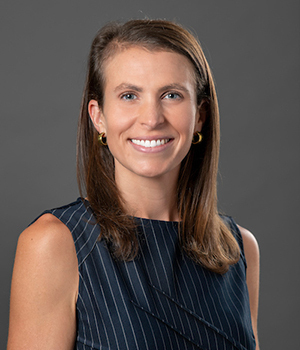Corporate boards with more women in positions of power lead to safer workplaces
The most coveted position in corporate America — the board of directors — historically has been criticized for excluding women and other underrepresented groups. Over the past several decades, however, state legislation and pressure from investors have motivated firms to increasingly recruit female directors.

Prior research has shown that having female directors on corporate boards can improve a firm’s financial performance, social responsibility, operations, product quality and recall decisions.
New research from the University of Notre Dame takes a first look at how workplace safety is affected by female board representation, finding similar benefits. There are fewer accidents and injuries on the job when boards have more women.
“However, simply adding women directors is not enough,” said Kaitlin Wowak, the Robert and Sara Lumpkins Associate Professor of Business Analytics at Notre Dame’s Mendoza College of Business. “Their influence on future workplace safety increases significantly when they hold powerful positions on key board committees because they feel more comfortable speaking up and get better traction on their ideas.”
Wowak, along with Yoonseock Son, assistant professor of information technology, analytics and operations at Mendoza, and Corinne Post from Villanova, analyzed a unique dataset covering 1,442 firm-year observations across 266 firms from 2002 to 2011.
Their findings are forthcoming in the Journal of Operations Management paper “From the Boardroom to the Jobsite: Female Board Representation and Workplace Safety.”

The team looked at OSHA workplace safety data and director-level variables from Institutional Shareholder Services, along with information from Violation Tracker including fines and penalties levied by U.S. regulatory agencies, the U.S. Department of Justice, state and regulatory agencies, and state attorneys general.
The research shows that boards with a higher representation of female directors prioritize and enhance workplace safety, likely because they tend to consider a wider range of stakeholders in their decision making, exhibit more risk aversion and favor regulatory compliance.
These findings are underscored by prior studies showing that female directors, in contrast to male directors, often have more experience in community outreach and philanthropy, making them more likely to advocate for prosocial issues. The team demonstrates that women are more likely to show greater consideration and care for employee well-being — including a desire not to harm in their decision making.
Greater focus on risk aversion and regulatory compliance at the board level may improve rule-following and protocols for properly using equipment. For example, the board could request that management monitor and report on safety precautions.
With workplace accidents estimated to cost U.S. employers more than $170 billion annually, Son said their findings can help firms avoid prioritizing efficiency at all costs — a critical determinant of unsafe work behaviors — while avoiding backlash from investors and stakeholders.
“A board with more women will specifically ask the top management team to report to them on workplace safety,” Son said. “Women will set the tone at the top that employees must strictly follow rules, including safety guidelines.”
In an empirical extension of their main analyses, the team looked at racial/ethnic minority (non-white) directors and got the same result, presumably because both groups have unique safety-relevant, social perspectives, yet share the characteristics of being underrepresented, non-prototypical board members whose views tend to be overlooked.
Further, the team found a synergistic effect with female and minority board representation.
“With more females in the upper echelons, the effect of similar minority representation on future workplace safety becomes even stronger, and vice versa,” Wowak said.
As the first study to suggest that board diversity can enhance a firm’s operations through workplace safety benefits, the team recommends companies also steer women and minorities onto influential board committees and boost accountability measures.
“Having power reduces their inhibitions, limits interference from others and provides more opportunities to speak up and steer discussions,” Son said. “And boards facing greater scrutiny are more likely to leverage their unique perspectives.”
Contact: Kaitlin Wowak, katie.wowak@nd.edu; Yoonseock Son, 574-631-1666, yson@nd.edu
Latest ND NewsWire
- Women of African ancestry may be biologically predisposed to early onset or aggressive breast cancersResearch from the University of Notre Dame is shedding light on why Black women are likely to have early-onset or more aggressive subtypes of breast cancer. The study published in iScience found that a population of cells in breast tissues, dubbed PZP cells, send cues that prompt behavioral changes that could promote breast cancer growth.
- First impressions count: How babies are talked about during ultrasounds impacts parent perceptions, caregiving relationshipPsychologist Kaylin Hill studied the impact of a parent’s first impression of their baby during an ultrasound exam. The words used by the medical professional to describe the baby (positive or negative) influence how the parents perceive their baby, relate to them after they're born and even how that child behaves as a toddler. The research has broad implications for how we train medical professionals to interact with expectant parents, as well as how we care for parents during the perinatal period when they are most susceptible to depression.
- Researchers at Notre Dame detect ‘forever chemicals’ in reusable feminine hygiene productsWhen a reporter with the Sierra Club magazine asked Graham Peaslee, a physicist at the University of Notre Dame, to test several different samples of unused menstrual underwear for per- and polyfluoroalkyl substances (PFAS) in 2019, the results fueled concern over chemical exposure in feminine hygiene products — which ultimately ended up in a $5 million lawsuit against the period and incontinence underwear brand Thinx. Then in 2023, the New York Times asked Peaslee to test 44 additional period and incontinence products for PFAS, a class of toxic fluorinated compounds inherently repellent to oil, water, soil and stains, and known as “forever chemicals” for their exceptionally strong chemical and thermal stability. Measurable PFAS were found in some layers of many of the products tested — some low enough to suggest the chemicals may have transferred off packaging materials, while others contained higher concentrations, suggesting the chemicals were intentionally used during the manufacturing process. In the meantime, another group of researchers published a study that found PFAS in single-use period products, leading Peaslee and his lab to widen their investigation into all sorts of reusable feminine hygiene products — often viewed as an eco-friendly option by consumers. Now, the results of that study have been published in Environmental Science & Technology Letters.
- Smarter tools for policymakers: Notre Dame researchers target urban carbon emissions, building by buildingCarbon emissions continue to increase at record levels, fueling climate instability and worsening air quality conditions for billions in cities worldwide. Yet despite global commitments to carbon neutrality, urban policymakers still struggle to implement effective mitigation strategies at the city scale. Now, researchers at Notre Dame’s School of Architecture, the College of Engineering and the Lucy Family Institute for Data & Society are working to reduce carbon emissions through advanced simulations and a novel artificial intelligence-driven tool, EcoSphere.
- Notre Dame Lead Innovation Team partners with local WIC program to identify, prevent lead poisoning in childrenB.A.B.E. store “shoppers” now have something new to help their families: free lead screening kits offered by the University of Notre Dame’s Lead Innovation Team.
- Vatican honors Martin and Carmel Naughton with papal awardThe late Pope Francis, in one of his last acts, conferred the honour of the Order of Saint Gregory the Great upon Carmel and Martin Naughton, Trustee Emeritus of the University of Notre Dame. The papal honor is in recognition of the Naughtons’ outstanding philanthropy in the areas of education and the arts, particularly in the provision of philanthropic support and scholarships to Catholic education at the University of Notre Dame and Kylemore Abbey, and in their transformative contributions to higher education in Ireland.













